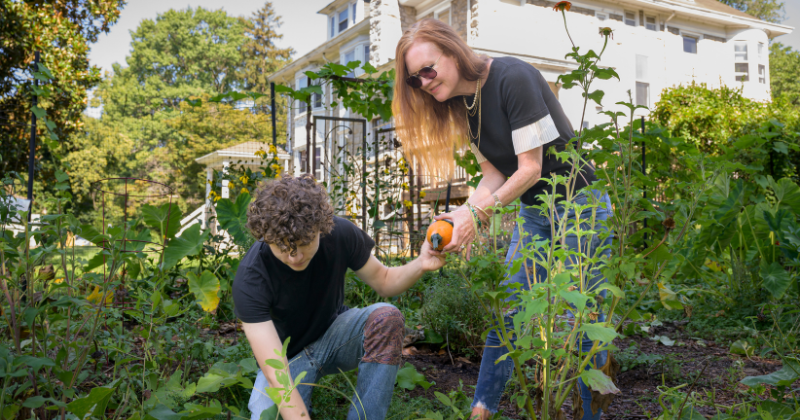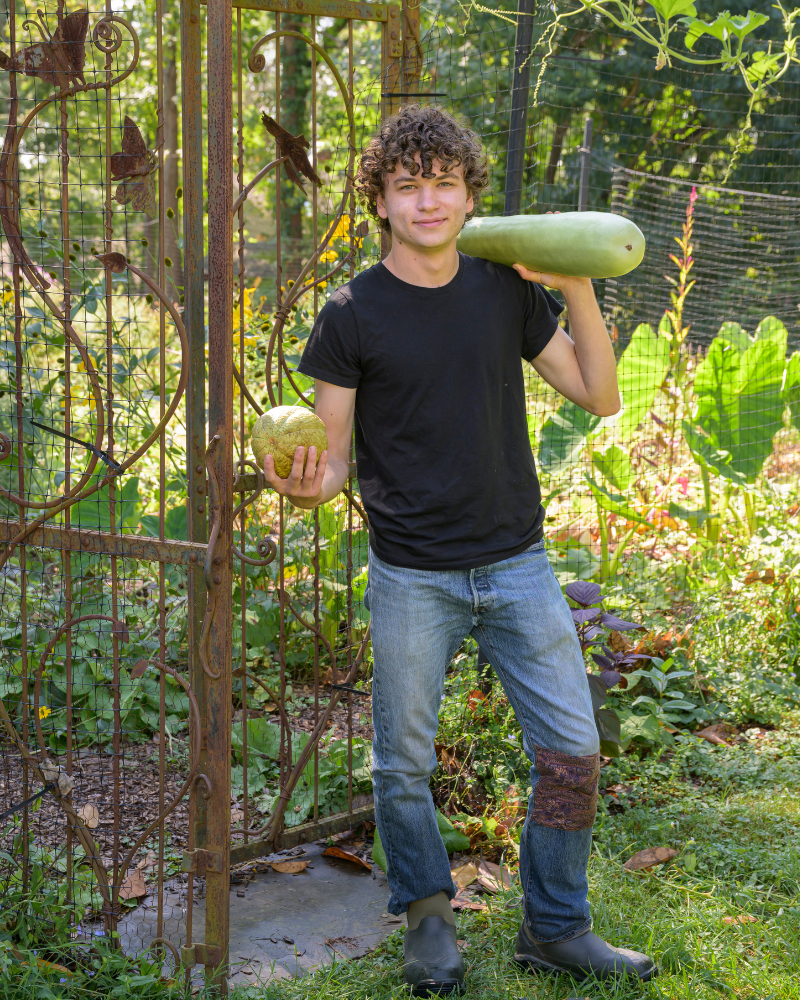


Growing new partnerships
Photos by Kathy F. Atkinson and Kaitlyn Diehl and courtesy of Elizabeth O’Conner and Al Mukhtar Al Barwani October 08, 2025
ELI garden harvests campus, community collaboration
Passing by the historic English Language Institute (ELI) building on West Main Street, you would never know there is a treasure trove of vegetables ready to be picked and flowers in bloom within a garden just to the left of the building. Thanks to the initiative of a University of Delaware sophomore and partnerships across UD and the Newark community, the long-forgotten garden has a new life.
The garden flourished for the first time in 2010 as a partnership between the ELI and the Food and Garden Policy Committee graduate student organization (FGPC), and was active until 2017 as a service learning and community garden, where ELI and UD students, faculty and alumni came together for a range of activities.

The vision for the garden’s revival began with James Bretzger, a sophomore landscape architecture major in the College of Agriculture and Natural Resources (CANR). Last year, Bretzger was looking for a space to garden on campus when he discovered the ELI’s plot. After getting permission, he turned the project into an independent study under his advisor, Anna Wik, associate professor of landscape architecture.
Although the garden was overgrown with brambles and weeds, Bretzger saw its potential.
“The good thing is, there was a blueprint for the garden,” he said. “I could tell exactly where all the paths were. Once they were in and the beds were separated from each other, I could get all the weeds out of the area and start planting.”
While Bretzger restored the garden’s 23 beds, he began growing tomatoes, cabbage, flax, radishes, peppers and many other plants in UD’s greenhouse on South Campus. When the roots were strong enough, he transplanted them to the new garden.
The garden is home to a huge variety of heirloom vegetables — vegetables from genetically pure seeds — that Bretzger acquired from his friend and mentor, William Woys Weaver, a local food historian, gardener and owner of The Roughwood Center for Heritage Seedways, in Devon, Pennsylvania.
“Thanks to Dr. Weaver, varieties you’ll see in the garden include the two-toned, eye-catching Bear Path squash. He found the squash in Berks County, Pennsylvania; it has historical connections to both the indigenous Lenni Lenape tribe and the Pennsylvania Germans,” Bretzger said.
Collaboration across campus and within the Newark community
Bretzger hasn’t had to “get in the weeds” all on his own; Elizabeth O'Connor, the ELI’s student life and housing manager, has been an invaluable resource. She secured a Cultural Activities and Public Events grant through the University of Delaware Faculty Senate Committee to help fund the project and provide gardening tools. Last year, she drove Bretzger around Newark to collect compost, transport plants, pick up equipment and more.
As the project unfolded and Bretzger’s needs became more complex and labor intensive, O’Connor enlisted the help of UD facilities and Newark’s Little Goat Coffee Shop, turning the garden into a community affair.

“James needed to create a very nutrient-dense soil for his plants, so I went pretty much every week and got coffee grounds from Little Goat Coffee Shop,” O’Connor said. “They’ve been very supportive.”
Michael Loftus, assistant director of UD facilities, also helped James clear out some of the debris and put down wood chips.
“They've been terrific to work with. It's a lot of work to get compost and prepare a garden, and the two of us were trying to do it on our own. I've been really thrilled with the University of Delaware's response to helping us out,” O’Connor said.
Planting seeds and forming friendships
ELI students have pitched in as well. In the spring, Bretzger was joined by Omani student Al Mukhtar Al Barwani, who shared his love of gardening.
“In Oman, most people have farms or at least small gardens, but that's less common in the big cities,” Al Barwani said. “My grandpa’s backyard garden is bigger than his house — it takes up about 75% of the land; he didn’t own a separate farm like most people back then. I grew up surrounded by this and so did my father and grandfather.”

Bretzger’s green thumb is also generational.
“My great grandparents had a 250-acre farm in Pennsylvania that they sold, and my grandparents have a couple of acres of land in Pennsylvania,” he said.
Al Barwani spent his last few weeks at the ELI helping Bretzger cultivate the garden. They learned a lot from each other in the process, cross-referencing the names of plants in their native tongues, sharing tips and tricks and discussing the differences and similarities in the vegetation able to grow in the Mid-Atlantic region of the U.S. versus in Oman’s arid climate.
When asked what surprised Bretzger and Al Barwani the most about working with somebody from a different culture, Bretzger responded: “That so many things are the same in certain ways. Even though in Oman I know a lot of their plant cultivation is based around date palms, which would not grow around here because the frost would kill them, there are many other plants that grow in both countries.”
Al Barwani chimed in to agree.
“I think it's interesting to see the similarities that we have in the names of plants, the types of plants that we plant and the different things that we do in the garden,” he said.

Plans for the future
Bretzger and O’Connor have big dreams for the future and the garden’s contributions to the greater community.
Currently, Bretzger is test-piloting the quality of two seeds in the ELI garden — the Spanish bean and the Cyprus Village melon — to see if they will grow in this climate and how they will taste. If they are successful, Roughwood will sell the seeds commercially.
Bretzger and O’Connor hope to donate some of the produce to local food banks and UD’s dining halls.
“We recently contacted them about donating our bottle gourds, which is a great start,” O’Connor said.
O’Connor also envisions the space becoming a tranquil safe haven for students amidst the chaos of campus life.
“I would love to be able to go there and see students sitting on the picnic tables, whether it's studying or just hanging out and enjoying the space,” she said. “I hope the process of having the garden will help students come together and learn from each other.”

Contact Us
Have a UDaily story idea?
Contact us at ocm@udel.edu
Members of the press
Contact us at mediarelations@udel.edu or visit the Media Relations website

